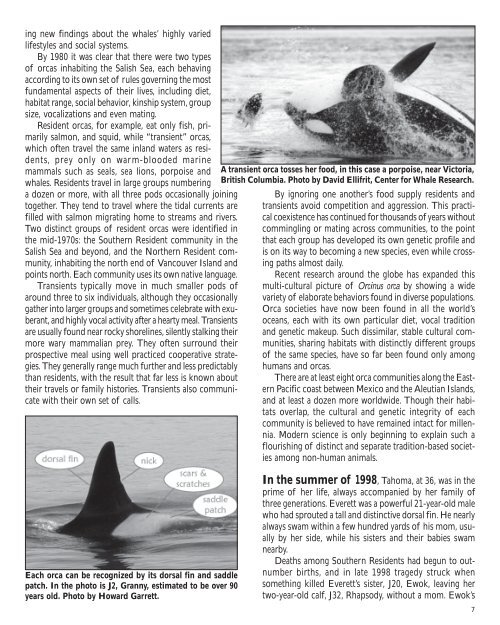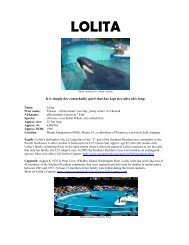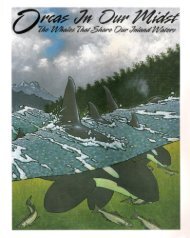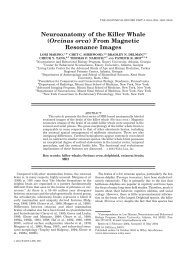You also want an ePaper? Increase the reach of your titles
YUMPU automatically turns print PDFs into web optimized ePapers that Google loves.
ing new findings about the whales’ highly variedlifestyles and social systems.By 1980 it was clear that there were two typesof orcas inhabiting the Salish Sea, each behavingaccording to its own set of rules governing the mostfundamental aspects of their lives, including diet,habitat range, social behavior, kinship system, groupsize, vocalizations and even mating.Resident orcas, for example, eat only fish, primarilysalmon, and squid, while “transient” orcas,which often travel the same inland waters as residents,prey only on warm-blooded marinemammals such as seals, sea lions, porpoise andwhales. Residents travel in large groups numberinga dozen or more, with all three pods occasionally joiningtogether. They tend to travel where the tidal currents arefilled with salmon migrating home to streams and rivers.Two distinct groups of resident orcas were identified inthe mid-1970s: the Southern Resident community in theSalish Sea and beyond, and the Northern Resident community,inhabiting the north end of Vancouver Island andpoints north. Each community uses its own native language.Transients typically move in much smaller pods ofaround three to six individuals, although they occasionallygather into larger groups and sometimes celebrate with exuberant,and highly vocal activity after a hearty meal. Transientsare usually found near rocky shorelines, silently stalking theirmore wary mammalian prey. They often surround theirprospective meal using well practiced cooperative strategies.They generally range much further and less predictablythan residents, with the result that far less is known abouttheir travels or family histories. Transients also communicatewith their own set of calls.A transient orca tosses her food, in this case a porpoise, near Victoria,British Columbia. Photo by David Ellifrit, Center for Whale Research.By ignoring one another’s food supply residents andtransients avoid competition and aggression. This practicalcoexistence has continued for thousands of years withoutcommingling or mating across communities, to the pointthat each group has developed its own genetic profile andis on its way to becoming a new species, even while crossingpaths almost daily.Recent research around the globe has expanded thismulti-cultural picture of Orcinus orca by showing a widevariety of elaborate behaviors found in diverse populations.<strong>Orca</strong> societies have now been found in all the world’soceans, each with its own particular diet, vocal traditionand genetic makeup. Such dissimilar, stable cultural communities,sharing habitats with distinctly different groupsof the same species, have so far been found only amonghumans and orcas.There are at least eight orca communities along the EasternPacific coast between Mexico and the Aleutian Islands,and at least a dozen more worldwide. Though their habitatsoverlap, the cultural and genetic integrity of eachcommunity is believed to have remained intact for millennia.Modern science is only beginning to explain such aflourishing of distinct and separate tradition-based societiesamong non-human animals.Each orca can be recognized by its dorsal fin and saddlepatch. <strong>In</strong> the photo is J2, Granny, estimated to be over 90years old. Photo by Howard Garrett.<strong>In</strong> the summer of 1998, Tahoma, at 36, was in theprime of her life, always accompanied by her family ofthree generations. Everett was a powerful 21-year-old malewho had sprouted a tall and distinctive dorsal fin. He nearlyalways swam within a few hundred yards of his mom, usuallyby her side, while his sisters and their babies swamnearby.Deaths among Southern Residents had begun to outnumberbirths, and in late 1998 tragedy struck whensomething killed Everett’s sister, J20, Ewok, leaving hertwo-year-old calf, J32, Rhapsody, without a mom. Ewok’s7







